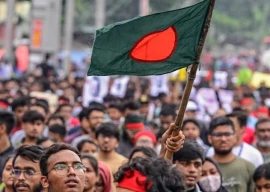
Credited with Turkey's thriving economy, Prime Minister Recep Tayyip Erdogan's party was expected to cruise to victory with a minor loss of votes compared to its 47-percent showing in the 2007 elections, according to pollsters.
Some opinion polls have predicted the AKP may hit the 50-percent mark.
The lingering question however is whether the party, in power since 2002, can secure an overwhelming parliamentary majority to press ahead with pledges to rewrite Turkey's constitution, the legacy of a 1980 coup.
Out of a population of some 73 million, more than 50 million were eligible to vote in almost 200,000 polling stations to renew the 550-seat parliament.
An ecstatic crowd burst into cheers and applause as Erdogan arrived to vote in a school in Istanbul's Uskudar district, an AKP stronghold.
"Turkey is proud of you," the crowd chanted, as the prime minister shook hands with supporters.
"I've been informed that voting is taking place in a quiet atmosphere across the country with a very high turnout," he said. "Everybody should respect the outcome."
The AKP owes its enduring popularity mostly to economic success and improved public services following years of financial instability that haunted Turkey under shaky coalition governments in the past.
Under the AKP, the economy grew by 8.9 percent in 2010, outpacing global recovery, and per capita income has doubled to $10,079.
But Erdogan, once the driving force of EU-sought reforms, has come under fire for autocratic tendencies and growing intolerance of criticism.
With dozens of journalists in jail, the opposition is alarmed also over creeping restrictions on the Internet and an unprecedented outbreak of compromising wiretaps and videos of opposition figures circulating online.
Sex tapes forced 10 top members of the Nationalist Action Party (MHP) to quit the election race, following a similar scandal last year that saw the head of the main opposition Republican People's Party (CHP) resign.
Led by a popular new chairman, Kemal Kilicdaroglu, the secularist centre-left CHP has built its election campaign on pledges of democratic reform, arguing the AKP is turning Turkey into a "police state."
"Enough is enough. We are fed up of intimidation. I want a country where I can live without fear," Meryem, a teacher in her 40s, said in Ankara's upscale district of Cankaya after casting a vote for the CHP.
The CHP, pollsters say, stands a chance to increase its vote from 20 to nearly 30 percent, and help deny the AKP the strong majority it craves.
Erdogan has refused to say what the constitutional overhaul would entail and fanned speculation with his advocacy of a presidential system for Turkey, presumably with himself at the helm.
The AKP needs at least 330 of the 550 seats to amend the constitution without support from other parties and put it to a referendum.
A two-thirds majority of 367 seats would enable the party to pass the amendments unilaterally.
Despite the sex tapes scandal, the MHP is expected to remain above the 10 percent threshold and enter parliament.
Candidates backed by the Kurdish Peace and Democracy Party but running as independents to circumvent the threshold are expected to increase their share from 20 to up to 30 seats.
The AKP has also won credit for humbling the once-omnipotent army and raising Turkey's international profile, notably through closer ties with Arab countries.
But Turkey's EU bid is in limbo amid a row over Cyprus and opposition to its accession by some bloc members.





1730884134-0/BeFunky-collage-(26)1730884134-0-270x192.webp)




1732618327-2/Untitled-design-(7)1732618327-2-270x192.webp)






COMMENTS (1)
Comments are moderated and generally will be posted if they are on-topic and not abusive.
For more information, please see our Comments FAQ